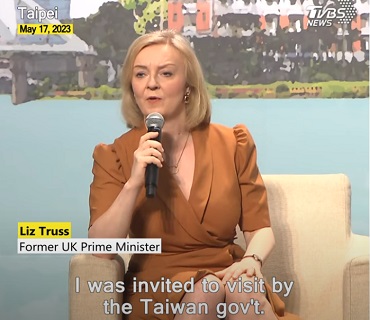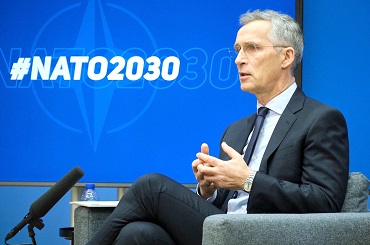Ex-British Prime Minister Liz Truss wants an international pact that would force nations to exclude China from economic deals and mandate them to come to each other’s defence, just as NATO’s Article 5 commits nations to joint military defence, if any member nation’s economy is “threatened”.
British Prime Minister for just 44 days in September-October 2022, Truss was in Taiwan for five days from 15 May 2023, leading the charge to surround and cut off China economically. Still a Member of Parliament, she is the most senior British politician to visit Taiwan since former Prime Minister Margaret Thatcher visited in 1992. She has been at the vanguard of the “Global Britain” push for British control over Asia for several years, acting from numerous ministerial positions.
Addressing Taiwan think tank the Prospect Foundation, ahead of the 19-21 May G7 summit in Hiroshima, Truss demanded the development of an “economic NATO” because institutions such as the UN Security Council, which includes China and Russia, cannot be relied upon to carry out Anglo-American strategic policy.
Truss said that she endorsed new PM Rishi Sunak’s declaration of “China as the biggest long-term threat in Britain” and insisted that “The UK’s Integrated Review needs to be amended to make it absolutely clear that China is a threat.” That 2021 review already united all agencies of government to target so-called “state threats”, specifically from Russia and China. The Review’s report, “Global Britain in a competitive age”, highlighted the growing importance of the “Indo-Pacific” region for the UK’s national security and economic prosperity.
Truss called for a revival of the Coordinating Committee for Multilateral Export Controls (COCOM), the Cold War body which coordinated the economic blockade of the Soviet Union. COCOM has been described as an economic adjunct of NATO, the North Atlantic Treaty Organisation. Established in 1949, COCOM was an informal alliance, but the Secretariat exercised veto power over its 17 member nations to enforce collective decisions regarding exports to communist bloc countries, according to a 2021 article in DefenceNews by Scott Jones, non-resident fellow with the Trade, Technology, and Security program at the Stimson Centre. In 2021 the US Senate Foreign Relations Committee, in the process of drafting the Strategic Competition Act, also proposed a new COCOM body to deal with China.
Truss nominated a “very obvious group of countries”, as she put it, as would-be members of a reformed COCOM, including all nations which have already put sanctions on Russia—all G7 nations, European Union countries, plus South Korea, Australia “and other willing parties”. Now that the UK has joined as a member, Truss noted the Comprehensive and Progressive Trans-Pacific Partnership (CPTPP) as “a vital geopolitical as well as vital economic agreement”. The free-trade agreement also includes Canada, Mexico, Peru, Chile, New Zealand, Australia, Brunei, Singapore, Malaysia, Vietnam and Japan. Truss pushed for the UK to champion Taiwan’s accession while blocking China, encouraging Japan, Canada and other allies to do likewise.
Summing up the growing push for economic containment of China, Truss pointed out, “We have NATO, we have the Indo-Pacific Quad, and there are various other discussion mechanisms but fundamentally we need a more coordinated approach. ... We cannot pretend that we have meaningful deterrence without hard power.” (Emphasis added.) Repeating the spurious claim that the coordination is aimed at preventing conflict in the region, she added: “That’s why I believe initiatives like AUKUS are so important and we’ve just seen AUKUS announce its plans to deliver a nuclear-powered submarine for Australia.”
‘Musketeer’ Truss, IPAC and the City of London
Truss also spoke about establishing an “economic NATO” in Tokyo, Japan in February, in her first major speech since leaving office. She was speaking at the InterParliamentary Alliance on China (IPAC) Symposium, along with former Australian Prime Minister Scott Morrison.
The IPAC is a group of legislators from various nations including Australia, founded in 2020 as a vehicle to coordinate anti-China policy initiatives. It was designed and is overseen by London think tank the Henry Jackson Society (HJS), which promotes regime change and war in the name of spreading “democracy”. It is funded by US government agency the National Endowment for Democracy (NED), which runs overt foreign interference operations worldwide; George Soros’s Open Society Foundations, infamous for funding Colour Revolutions; and the Taiwan Foundation for Democracy, an umbrella group for Taiwanese political parties. Throughout the early 2020s NATO-style economic arrangements have been pushed by a wide array of anti-China lobbies in Britain, the USA and Australia.
In a show of blatant hypocrisy, Truss declared in her Tokyo speech that the G7 should use its “economic weight [to] influence other countries”, using its “leverage to ensure that the G7 plus allies act as an economic NATO”.
“There are ways this can be done”, she said. “We could move to an economic Article 5, where the ‘one for all, all for one’ principle is wielded in defence of fundamental values.” The focus would be on locking down friendly supply chains, investment and trade, to the exclusion of China. Nations involved must commit to “audit and reduce dependency throughout critical industries”, she added, pushing for the UK to decouple from China: “We cannot have more integration with the Chinese economy.”
Truss cited the Russia-Ukraine war to argue that the West must intervene more strongly in Taiwan, raising the prospect of a near-term war provocation in the Asia-Pacific region. She lamented that the West was too slow to act to bring Ukraine fully into its orbit, asking, “if we had admitted Ukraine to NATO, would Putin have dared to invade? Or indeed if we had put stronger sanctions in place after 2014 or supplied weapons to Ukraine earlier?”
We have to learn from this experience, she continued, and “ensure that Taiwan is able to defend itself”. She called for elevating Taiwan’s status, advocating its inclusion in international organisations.
Truss had earlier pushed economic NATO as UK Foreign Secretary, laying out the idea in an April 2022 speech at the City of London Lord Mayor’s Easter banquet, on the topic “The return of geopolitics”: “In a world where malign actors are trying to undermine multilateral institutions, we know that bilateral and plurilateral groups will play a greater role. Partnerships like NATO, the G7 and the Commonwealth are vital.
“We should keep strengthening our NATO alliance with bonds around the world, like the UK-led Joint Expeditionary Force, the Five Eyes, and the AUKUS partnership we have with the US and Australia. And we want to keep growing our ties with countries like Japan, India and Indonesia.
“We also should build on the strong core that we have in the G7. During the UK’s Presidency last year I was pleased to bring friends like Australia, Korea, India, South Africa and ASEAN to the table.
“The G7 should act as an economic NATO, collectively defending our prosperity. If the economy of a partner is being targeted by an aggressive regime we should act to support them. All for one and one for all.”
From Global Britain and Asia Pivot to Global NATO
The premise of Truss’s economic NATO was implicit in the Global Britain doctrine, which although a recent phenomenon under that name, harks from post-Cold War plans to expand the reach of the UK beyond Europe and into Asia, via the Commonwealth. In 2016-17, following Brexit, that agenda was put into its current incarnation by PM Theresa May and Foreign Minister Boris Johnson. In a 2 December 2016 speech titled “Beyond Brexit: A Global Britain”, Johnson outlined Britain’s plans to dominate the globe despite comprising less than one per cent of world population. With “the rise of new powers”, he said, “it is right that we should make a distinctive approach to policy-making as regards China and East Asia.”
The concept, also known as “Empire 2.0”, was matched by the USA when President Barack Obama, in a 2011 speech to the Australian Parliament, declared the USA would pivot its national security focus to the Asia-Pacific. The original Trans-Pacific Partnership (TPP) formed the economic component of the “Asia Pivot” proposal to surround China militarily. Secretary of State Hillary Clinton in 2012 described trans-Atlantic free trade pact the Transatlantic Trade and Investment Partnership (TTIP) as an “economic NATO”; speaking about the TPP in 2015, Obama declared, “we can’t let countries like China write the rules of the global economy. We should write those rules”. (“Biden’s ‘Asia Tsar’ driving Australia to war with China”, AAS, 6 July 2022.)
As Secretary of State for International Trade, Liz Truss led the post-Brexit charge for Global Britain. Negotiating the UK-Australia free trade agreement, she praised the common heritage and values of Australia and Britain as underpinning the rules-based order from which China is explicitly excluded. The trade deal would “send a powerful signal” in defence of those principles “of cooperation and free exchange”, she told the Australian on 18 June 2020. In April 2021, Truss noted that the deal with Australia was a “steppingstone to CTPP accession”. “With Australia, we have global opportunities”, she declared. Truss had picked up the trade negotiations from UK Minister for Trade and Export Promotion and former HSBC director Baroness Rona Fairhead. In Australia in 2018, Fairhead spoke on the topic “Australia and the UK: Opportunities in a post-Brexit world”. The trade agreement, and specifically avenues for Britain to monopolise Belt and Road financial flows, was also promoted by Lord Mayor of the City of London, Charles Bowman, upon visiting Australia. (The City of London is not the Greater London municipal body, but an ancient, private corporation representing the City’s banks.) In its submission to a 2017 Australian parliamentary inquiry on the free trade deal, notorious dirty money manager HSBC admitted outright that free access to Australian markets is Britain’s “way of capturing growth in Asia”. (“HSBC minister pushes Trojan Horse trade agreement”, AAS, 10 Oct. 2018.)
As for NATO itself, the alliance has been pushing beyond its trans-Atlantic origins for some time. With the 2020 launch of the NATO 2030 project, that drive went into high gear, elevating cooperation with Asia-Pacific partners Australia, New Zealand, Japan and South Korea (p. 6)— aimed at countering China and its outreach vehicles such as the Belt and Road Initiative. Israel has been included to make “NATO Plus 5”. This expansion also allows “NATO partners” such as Georgia and Ukraine to participate in NATO actions without requiring formal NATO membership. In May the US House China Select Committee proposed adding India to the NATO Plus group, recommending coordinated action to counter China economically between the G7, NATO, NATO+5, and Quad members, in preparation for conflict over Taiwan. All of this indicates rapid motion towards “Global NATO”, which SecretaryGeneral Jens Stoltenberg has long been pushing, including in the realm of economic collaboration which is specified in Article 2 of the NATO charter. (“NATO invades the Pacific”, AAS, 8 July 2020.)
By Elisa Barwick, Australian Alert Service, 14 June 2023








